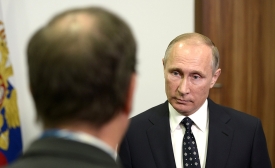nato
The end of Cold war and dismantling of mighty Soviet Union along with dissolution of Socialist system in East Europe, Russia, having lost the Cold War to USA, was forced to lay down for years as its allies began dropping the Kremlin and joining the USA and Europe through NATO and EU. Further, dismantling of anti-West military alliance Warsaw Pact increasingly weakened Russia as it gradually lost its influence globally.

As the President-elect wades into foreign policy, criticism of Putin is noticeably absent.
When Donald J Trump is sworn in on 20 January as the 45th President of the United States, the UK needs to make a choice. Trump’s unique and unpredictable blend of belligerence and isolationism means the US can no longer be relied on to defend the liberal, rules based international order in place since the end of the Second World War. This could mark the end of an era for UK foreign policy.
With the election of Donald Trump to the presidency, the issue of U.S.-Russia relations is acquiring a new importance. Russia figured prominently in the discussion of the U.S. elections and in debates about the direction of American foreign policy. Now the central question is whether or not the possibility of warmer relations between the two sides—or even a new détente—exists? What would it take to adopt a fresh approach?
A decade ago, NATO’s Public Diplomacy Division and its stakeholders stared blankly at the skyrocketing evolution of social media. Facebook, LinkedIn, Flickr, Twitter—just to name a few—were new phenomena which at first seemed to attract young people, but had no place in a serious international organization that dealt with high-level political topics, let alone security and defense.

The organization has come a long way in terms of digital communications strategy.







